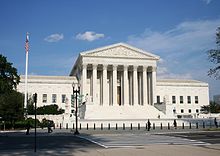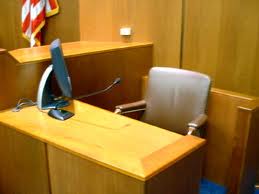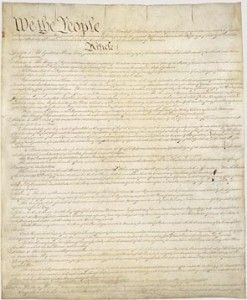 Like most of you, I have been somewhat riveted by the debate of recent times spawned by the refusal of some NFL players to stand and show respect for the US Flag during the national anthem before games. The President waded into that debate over the last weekend, perhaps unwisely, but time will tell. What I want to concentrate on here is tangent to the debate, but still important. Jim Harbaugh, the Michigan football coach, responded by telling the President to read the Constitution. If I understand his statement correctly, he was suggesting that the President was violating the free speech rights of the NFL players given in the First Amendment. But this is patently untrue. It is a fallacy we all fall into sometimes. When we are debating someone else, especially if that someone else is a good debater, we resort to a false challenge. This happens a lot from those on the Left side of the political spectrum but they are not by themselves. What they are really arguing for is “freedom from criticism.” The First Amendment does not say we have freedom from criticism. NFL players who are unhappy with America have the right to criticize by kneeling down during the national anthem. Others have the right to criticize those players if they disagree. Even Presidents have freedom of speech, although we can criticize them and even vote them out of office. As a Pastor and Seminary prof, I received plenty of criticism. If we are supposed to be free from criticism, I want to pass the offering plate again. Somebody out there owes me something!
Like most of you, I have been somewhat riveted by the debate of recent times spawned by the refusal of some NFL players to stand and show respect for the US Flag during the national anthem before games. The President waded into that debate over the last weekend, perhaps unwisely, but time will tell. What I want to concentrate on here is tangent to the debate, but still important. Jim Harbaugh, the Michigan football coach, responded by telling the President to read the Constitution. If I understand his statement correctly, he was suggesting that the President was violating the free speech rights of the NFL players given in the First Amendment. But this is patently untrue. It is a fallacy we all fall into sometimes. When we are debating someone else, especially if that someone else is a good debater, we resort to a false challenge. This happens a lot from those on the Left side of the political spectrum but they are not by themselves. What they are really arguing for is “freedom from criticism.” The First Amendment does not say we have freedom from criticism. NFL players who are unhappy with America have the right to criticize by kneeling down during the national anthem. Others have the right to criticize those players if they disagree. Even Presidents have freedom of speech, although we can criticize them and even vote them out of office. As a Pastor and Seminary prof, I received plenty of criticism. If we are supposed to be free from criticism, I want to pass the offering plate again. Somebody out there owes me something!
Archive for category Government
I blogged last Fall about my first opportunity ever to be a witness in a trial. Earlier this week I had something else happen to me tha t had never happened before in my entire life (I am about to turn 59). I was selected to be on a jury at the Lackawanna Courthouse in Scranton, PA. I have been in many jury pools and made it to the selected group to be questioned by lawyers to see which folks from the jury pool make it into the 12-seat box of jurors. But never had I been selected to be on a jury. It has been my assumption that all these years it is mostly because I was a Baptist minister. But nothing prevented it this time.
t had never happened before in my entire life (I am about to turn 59). I was selected to be on a jury at the Lackawanna Courthouse in Scranton, PA. I have been in many jury pools and made it to the selected group to be questioned by lawyers to see which folks from the jury pool make it into the 12-seat box of jurors. But never had I been selected to be on a jury. It has been my assumption that all these years it is mostly because I was a Baptist minister. But nothing prevented it this time.
I learned a lot of things in terms of judge’s instructions, rules for evidence, rules for jury note-taking, deliberation, video depositions, role-playing testimony, etc. I learned how to work with 11 other people to talk things through in a tense kind of situation. The case was a civil law suit in light of a car accident. We decided unanimously in favor of the defendant.
As I sat there through the two-day trial, I wondered again at our country and system with all of its faults. However, I thanked the Lord that in such cases, we can be judged by twelve of our peers instead of by some government bureaucrat or military figure.
 The most important decision issued by the U. S. Supreme Court this year was not its decision on President Obama’s healthcare legislation, important as that issue is for the future of America. The most significant ruling in my opinion was given in the Hosanna-Tabor case. This case was heard by the Court last October and the verdict given in January of this year (2012). I have a printed copy which can easily be found online.
The most important decision issued by the U. S. Supreme Court this year was not its decision on President Obama’s healthcare legislation, important as that issue is for the future of America. The most significant ruling in my opinion was given in the Hosanna-Tabor case. This case was heard by the Court last October and the verdict given in January of this year (2012). I have a printed copy which can easily be found online.
This case involved the dismissal of a called minister of a local Lutheran congregation. The issue started with some disability questions involving the minister and Christian school teacher. Eventually, the church had to give the position to another person in order for the ministry to be carried out. When the original minister wanted to come back and pursue the position again, the church refused — a course had been set. The minister challenged the decision to let someone else continue in the position. The church told the minister to follow the appeal procedures used within the Lutheran Church’s hierarchy to handle disputes. The minister refused and instead sued the Church. The Hosanna-Tabor congregation viewed this unwillingness to follow the procedures for handling disputes as insubordination and rescinded the call of this minister. The case went all the way to the Supreme Court.
Last Monday (October 24, 2011) I delivered what we call a Faculty Forum Paper during the chapel time at Baptist Bible Seminary. The topic was “The Biblical Basis of the United States Constitution.” Although I have made presentations of this topic in Sunday School classes, ABFs, and small groups, this is the first time I have committed my thoughts to a formal paper format. It is my conviction that the Founding Fathers were steeped deeply in Judeo-Christian ethics and not secular Enlightenment thought. While they may have adopted a kind of “Christian Enlightenment” in the sense of using reason more strongly than past generations, they nonetheless did not erase a predominately Protestant view of the Bible and the world as the underpinning for life. I would not mind getting feedback from others on my paper. The link is given below.
 Yesterday (Tuesday, October 25, 2011) I was a witness at a trial for the first time in my life. I was a witness for Northmoreland Baptist Church (Pastor Howell) in the Tunkhannock, Pennsylvania area. The church is challenging a tax assessment of its multi-purpose room by the county. As I was sitting there, I was thinking that this was an honorable way or method for people to work out their complaints with each other. In some places in the world, this kind of disagreement would not be handled this way at all–in fact disagreement with authorities would not even be allowed.
Yesterday (Tuesday, October 25, 2011) I was a witness at a trial for the first time in my life. I was a witness for Northmoreland Baptist Church (Pastor Howell) in the Tunkhannock, Pennsylvania area. The church is challenging a tax assessment of its multi-purpose room by the county. As I was sitting there, I was thinking that this was an honorable way or method for people to work out their complaints with each other. In some places in the world, this kind of disagreement would not be handled this way at all–in fact disagreement with authorities would not even be allowed.
My testimony was for the purpose of showing Baptist views of worship and that the church in question was using its facilities in a way consistent with Baptist theology and tradition. In doing so, I feel like I not only supported the cause of Christ for the church but also did my civic duty for the community.

